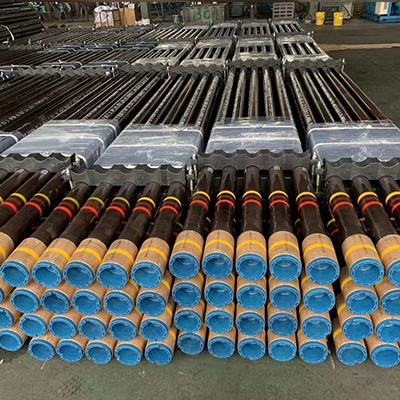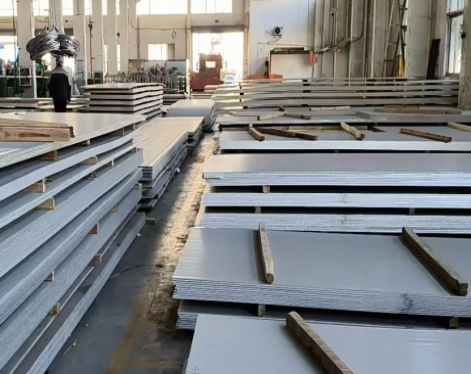When it comes to constructing water wells, the choice of materials is crucial for ensuring longevity, reliability, and efficiency. One of the most widely used materials for well casing pipe is steel. In particular, steel well casing pipes offer a range of benefits that make them an ideal choice for such applications. In this article, we will explore the key advantages of steel well casing pipes and their applications, along with important considerations for their selection and installation.
1.The Advantages of Steel Well Casing Pipes
(1)Durability and Strength
Steel well casing pipes are known for their exceptional durability and strength. As a material, steel is highly resistant to corrosion, abrasion, and structural damage, making it well-suited for use in challenging geological conditions. This durability ensures that steel well casing pipes can withstand the rigors of installation, operation, and environmental factors over an extended service life.

(2)Corrosion Resistance
Corrosion is a significant concern in water well construction, particularly in environments where the water has high levels of acidity or other corrosive elements. Steel well casing pipes are available with protective coatings and linings that enhance their resistance to corrosion, ensuring that the integrity of the well is maintained over time.
(3)Compatibility with Different Aquifers
Steel well casing pipes are suitable for use in a wide range of aquifers, including those with varying pH levels and mineral content. This versatility makes steel a reliable choice for well construction in diverse geographical locations and geological formations, providing consistent performance across different water sources.
(4)Tightness and Leak Prevention
Proper sealing and prevention of leaks are critical in ensuring the efficiency and safety of water wells. Steel well casing pipes can be manufactured with precision to achieve tight connections and joints, minimizing the risk of leakage and contamination. This not only preserves the quality of the extracted water but also minimizes the need for maintenance and repairs.
(5)Sustainable and Recyclable
Steel is a sustainable material with significant recyclability. By choosing steel well casing pipes, stakeholders in water well construction contribute to environmentally friendly practices by promoting the reuse and recycling of steel products.
2.Applications of Steel Well Casing Pipes
(1)Domestic Water Supply Wells
In residential, commercial, and industrial settings, steel well casing pipes are commonly used for constructing water supply wells. Their ability to withstand varying water quality conditions and their long-term reliability make them a preferred choice for delivering clean and safe water to communities.
(2)Agricultural Irrigation Wells
Agricultural operations rely on water wells for irrigation purposes. Steel well casing pipes are employed in these applications due to their strength, durability, and resistance to soil and water contaminants, ensuring consistent water supply for crop irrigation.
(3)Environmental Monitoring Wells
For environmental monitoring and remediation projects, steel well casing pipes provide secure installations for groundwater sampling and monitoring equipment. Their corrosion resistance and structural integrity make them suitable for long-term use in environmental applications.
3.Considerations for Selection and Installation
(1)Material Specifications
When selecting steel well casing pipes, it is essential to consider the specific material specifications, including the grade of steel, protective coatings, and dimensional requirements. These specifications should align with the anticipated operating conditions and the properties of the surrounding geological formations.
(2)Installation Techniques
Proper installation techniques are critical for maximizing the performance and service life of steel well casing pipes. This includes methods for ensuring vertical alignment, effective grouting, and proper sealing to prevent ingress of contaminants and maintain well integrity.
(3)Regulatory Compliance
Compliance with local, state, and federal regulations pertaining to well construction and materials is paramount. Stakeholders should ensure that the selected steel well casing pipes meet the necessary standards and certifications for use in water well applications.
Conclusion
Steel well casing pipes play a vital role in the construction of water wells, offering durability, reliability, and performance across various applications. With their corrosion resistance, strength, and compatibility with different aquifers, steel well casing pipes provide sustainable solutions for delivering clean and safe water to communities, supporting agricultural activities, and facilitating environmental monitoring efforts. By understanding the advantages of steel well casing pipes and adhering to best practices in their selection and installation, you can ensure the long-term success of water well projects while contributing to sustainable water resource management.
1.The Advantages of Steel Well Casing Pipes
(1)Durability and Strength
Steel well casing pipes are known for their exceptional durability and strength. As a material, steel is highly resistant to corrosion, abrasion, and structural damage, making it well-suited for use in challenging geological conditions. This durability ensures that steel well casing pipes can withstand the rigors of installation, operation, and environmental factors over an extended service life.

(2)Corrosion Resistance
Corrosion is a significant concern in water well construction, particularly in environments where the water has high levels of acidity or other corrosive elements. Steel well casing pipes are available with protective coatings and linings that enhance their resistance to corrosion, ensuring that the integrity of the well is maintained over time.
(3)Compatibility with Different Aquifers
Steel well casing pipes are suitable for use in a wide range of aquifers, including those with varying pH levels and mineral content. This versatility makes steel a reliable choice for well construction in diverse geographical locations and geological formations, providing consistent performance across different water sources.
(4)Tightness and Leak Prevention
Proper sealing and prevention of leaks are critical in ensuring the efficiency and safety of water wells. Steel well casing pipes can be manufactured with precision to achieve tight connections and joints, minimizing the risk of leakage and contamination. This not only preserves the quality of the extracted water but also minimizes the need for maintenance and repairs.
(5)Sustainable and Recyclable
Steel is a sustainable material with significant recyclability. By choosing steel well casing pipes, stakeholders in water well construction contribute to environmentally friendly practices by promoting the reuse and recycling of steel products.
2.Applications of Steel Well Casing Pipes
(1)Domestic Water Supply Wells
In residential, commercial, and industrial settings, steel well casing pipes are commonly used for constructing water supply wells. Their ability to withstand varying water quality conditions and their long-term reliability make them a preferred choice for delivering clean and safe water to communities.
(2)Agricultural Irrigation Wells
Agricultural operations rely on water wells for irrigation purposes. Steel well casing pipes are employed in these applications due to their strength, durability, and resistance to soil and water contaminants, ensuring consistent water supply for crop irrigation.
(3)Environmental Monitoring Wells
For environmental monitoring and remediation projects, steel well casing pipes provide secure installations for groundwater sampling and monitoring equipment. Their corrosion resistance and structural integrity make them suitable for long-term use in environmental applications.
3.Considerations for Selection and Installation
(1)Material Specifications
When selecting steel well casing pipes, it is essential to consider the specific material specifications, including the grade of steel, protective coatings, and dimensional requirements. These specifications should align with the anticipated operating conditions and the properties of the surrounding geological formations.
(2)Installation Techniques
Proper installation techniques are critical for maximizing the performance and service life of steel well casing pipes. This includes methods for ensuring vertical alignment, effective grouting, and proper sealing to prevent ingress of contaminants and maintain well integrity.
(3)Regulatory Compliance
Compliance with local, state, and federal regulations pertaining to well construction and materials is paramount. Stakeholders should ensure that the selected steel well casing pipes meet the necessary standards and certifications for use in water well applications.
Conclusion
Steel well casing pipes play a vital role in the construction of water wells, offering durability, reliability, and performance across various applications. With their corrosion resistance, strength, and compatibility with different aquifers, steel well casing pipes provide sustainable solutions for delivering clean and safe water to communities, supporting agricultural activities, and facilitating environmental monitoring efforts. By understanding the advantages of steel well casing pipes and adhering to best practices in their selection and installation, you can ensure the long-term success of water well projects while contributing to sustainable water resource management.
Previous:Welded tube astm sizes









